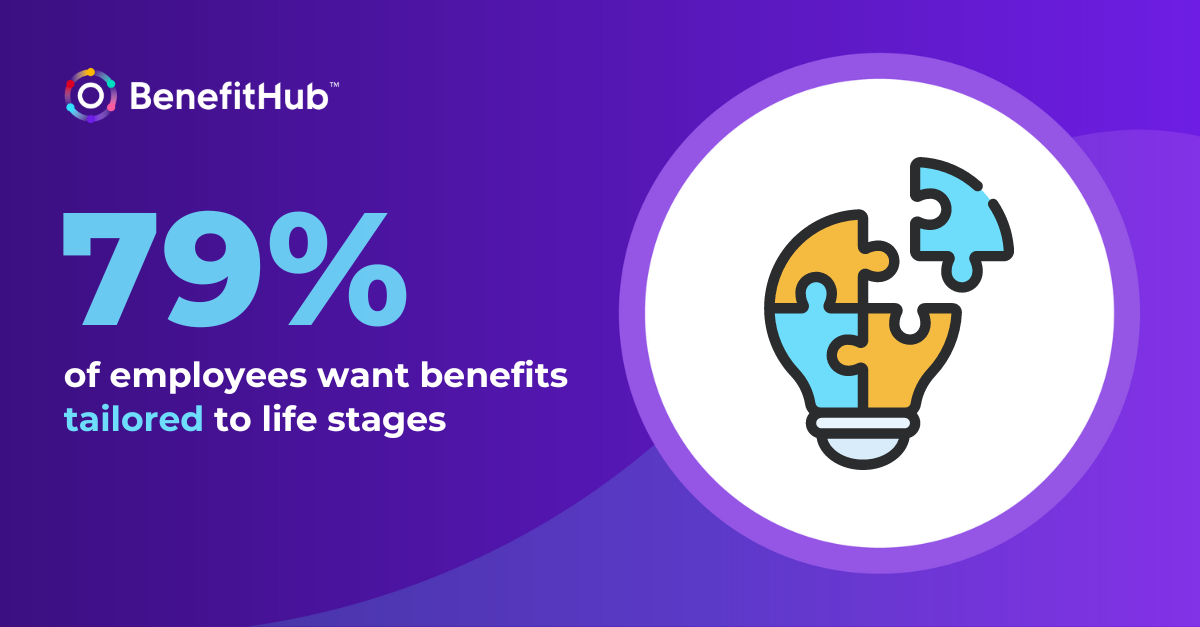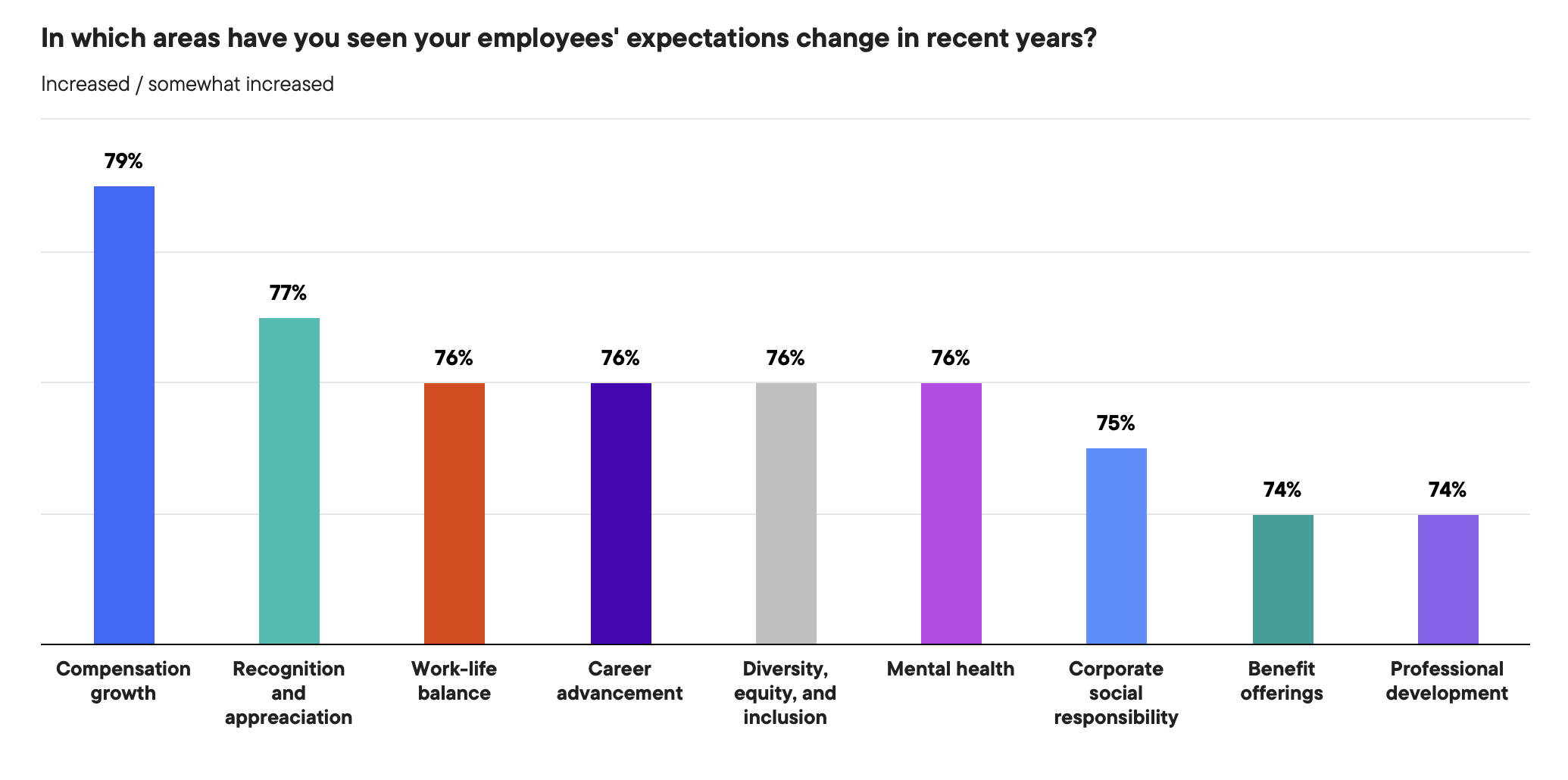Enhance your compensation package with voluntary benefits to attract and retain top talent in today's competitive job market.
Key Takeaways:
A one-size-fit-all benefits package no longer suits the increasingly diverse workforce, and there is growing desire for expanded offerings. Employers can stand out from competitors by investing in voluntary benefits.
- 51% of professionals are unsatisfied with their 2024 benefits package
- 79% of employees want benefits tailored to life stages
- 68% of employees agreed that voluntary benefits are an essential part of a benefits pack
- Mental and financial health are top areas of concerns among the workforce
Understanding the Importance of Voluntary Benefits
In today's competitive job market, traditional employee benefits are no longer enough to attract and retain top talent. More than half (51%) of employees are not satisfied with their 2024 benefits package as-is, and may begin looking for companies that have more comprehensive offerings (1). More than ever, employees are looking for more than just the basics when it comes to their compensation package. That's where voluntary benefits come in. Voluntary benefits are additional perks and incentives that companies can offer to their employees, beyond the standard benefits package, oftentimes at little to no cost to the employer. Read more about top voluntary benefits here.
Studies have found that employees consider voluntary benefits to be an essential part of their overall compensation package. In fact, according to Buck's 2022 Wellbeing and Voluntary Benefits Survey, 68% of employees agreed that voluntary benefits are an essential part of a benefits package (2). These benefits can include things like home & auto insurance, health & wellness initiatives, employee discount programs, and more.
Why Traditional Employee Benefits are No Longer Enough
Traditional employee benefits, such as health insurance and retirement plans, are important, but they are no longer enough to meet the needs and expectations of today's employees. Employees are looking for more comprehensive and personalized benefits that can help them save money and manage their finances. According to Franklin Templeton, employee expectations about benefit offerings has increased by 74% in recent years (3).
As the job market becomes increasingly competitive, companies need to think outside of the box to attract and retain top talent. Furthermore, employee needs are changing. Subsets of the workforce, divided by age, gender, industry, and more, expect different benefits. For example, women, Gen Z, Millennials, employees with disabilities, and people of color are more likely to expect employers to demonstrate care in their personal lives, while Boomers and manual labors do not have the same expectations (4).
Value of Offering Voluntary Benefits to Employees
First and foremost, expanded benefits packages that address the growing range of employee needs can help attract and retain top talent. Modern employees are looking for more than just a paycheck. They want to work for a company that values them and offers additional perks and incentives. In 2023, 93% of employee consider workplace well-being as important as salary, compared to only 83% in 2022 (4). Furthermore, 87% of employees would consider leaving a company that does not focus on their well-being, and 65% say having access to well-being programs at work improved their productivity (4).
Along with increasing productivity, access to voluntary benefits can also help improve employee morale and engagement. When employees feel appreciated and rewarded for their hard work, they are more likely to be motivated and engaged - leading to better overall performance.
Additionally, voluntary benefits can help employees save money and manage their finances. For example, offering a recognition and rewards program can allow employees to earn points or incentives that they can use towards purchases or experiences, or offering employee discounts through a platform like BenefitHub. Helping employees save money on things they would have otherwise had to pay for out of pocket can make paychecks stretch further, and increase the perceived value of their compensation. 61% of employees agree that voluntary benefits provide a better value than buying similar services outside of their employer (2).
Future Trends in Voluntary Benefits
The world of voluntary benefits is constantly evolving, and it's important for companies to stay ahead of the curve. Some future trends include personalization, technology integration, greater emphasis on mental health, and focus on financial wellness.
As employees continue to seek flexibility and choice in their benefits, personalization will become increasingly important. Companies will need to offer a range of options that can be tailored to individual employee needs and preferences. Employees today have different priorities and preferences when it comes to their benefits, and 79% of employees want benefits tailored to life stages, as well as their positions and personal circumstances (4). One-size-fits-all benefits packages no longer suit the increasingly diverse workforce, and customization is needed to support the full range of employee mental, physical, and financial needs without compromising costs.

Technology will play a key role in the future of voluntary benefits. From digital platforms that make it easy for employees to access and manage their benefits, to data analytics that help companies better understand employee needs, technology will continue to transform the voluntary benefits landscape. AI in the workplace is becoming more commonplace, and employees report more optimism than pessimism towards the new capabilities.
Increased focus on mental health is a trend affecting all areas of life, and it exists in the workforce as well. Voluntary benefits that support employee well-being, such as access to counseling services or wellness programs, will be in high demand. As more companies begin to offer these services, we do see a slight increase (3%) in reported employee mental health in 2024 (4). However, 31% of employees are still struggling with mental health (4).
Mental health is only one element of holistic wellbeing - financial health, social health, and physical health are also contributing factors. A sharp decline in reported financial health in 2023, and lingering financial stress in 2024, are impacting overall reported employee health. As employees look for ways to combat this stress, save money, and manage their finances, voluntary benefits that focus on financial wellness are becoming increasingly popular. This can include things like financial planning resources, student loan assistance programs, or retirement savings tools. 57% of employees do not consider themselves financially healthy; according to Buck, "employers plan to invest most in physical wellbeing, yet financial health is the #1 need cited by employees" (2).
By staying informed about these future trends, companies can ensure their voluntary benefits program remains relevant and attractive to employees.
How BenefitHub Can Help
BenefitHub is a leading provider of employee discounts and comprehensive benefits solutions. Our platform offers a wide range of benefits that can help companies attract and retain top talent, improve employee engagement, and provide valuable perks and incentives to employees.
With BenefitHub, you can customize your voluntary benefits program to meet the unique needs of your workforce. If you're ready to enhance your compensation package with voluntary benefits, BenefitHub is here to help. Contact us today to learn more about our solutions and how we can support your employee benefits strategy.
Sources:
(1): Glassdoor Economic Research. "Conversation Starter: Half of Professionals are Not Satisfied with 2024 Benefits Package"
(2): Buck 2022 Wellbeing and Voluntary Benefits Survey Report
(3): Franklin Templeton: 2024 Voice of the American Workplace Survey
(4): Metlife's 22nd Annual U.S. Employee Benefit Trends Study 2024


